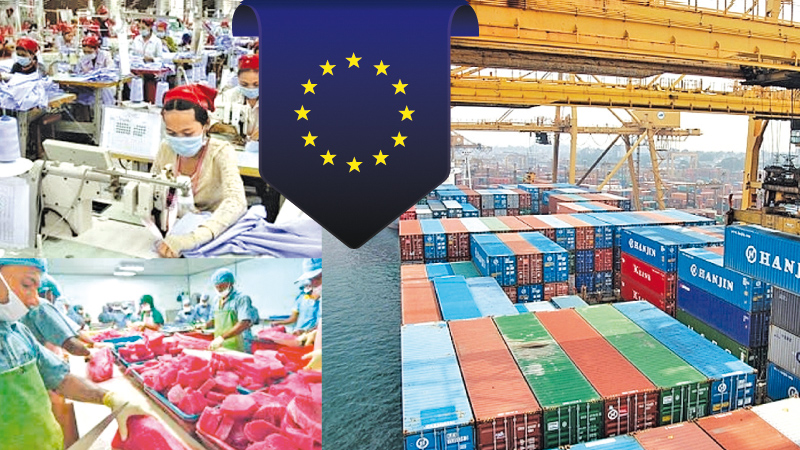The European Union has decided to grant Sri Lanka enhanced market access under GSP+ from Friday (19) as a reform incentive.
Sri Lanka will re-acquire GSP+ status this Friday, European Union’s Ambassador to Sri Lanka and the Maldives Tung-Lai Margue, told journalists in Colombo yesterday.
“The GSP+ decision will be published in the official journal of the European Union on Thursday. That means one day after the publication exports from Sri Lankan manufacturers will be allowed to enter the EU without any Customs duties,” Margue said. He said the EU will remove a significant part of the remaining import duties on Sri Lankan products entering the EU market in exchange for the country’s commitment to ratify and effectively implement 27 international conventions on human rights, labour conditions, protection of the environment and good governance. These one-way trade preferences will consist of the full removal of duties on 66% of tariff lines, covering a wide array of products including textiles and fisheries. The removal of duties will come into force the day after publication in the official journal of the EU, he added.
 Margue remarked that GSP+ will create great incentives to increase Sri Lankan exports to the EU, which is already the country’s biggest export market.
Margue remarked that GSP+ will create great incentives to increase Sri Lankan exports to the EU, which is already the country’s biggest export market.
In 2016, EU imports from Sri Lanka totalled 2.6 billion euros, and Margue noted that this number will grow larger with GSP+.
“The direct benefits based on present exports to the EU will be roughly 300 million euros per year, and this could of course increase and reach 1 billion euros in a few years,” he said.
The exporters of garments and textiles, rubber products, small machinery, fisheries, food products and tea stand to gain the most from the improved trade status, according to the Ambassador.
He also remarked GSP+ will help reduce Sri Lanka’s trade deficit and encourage Sri Lankan companies to diversity their exports due to their increased competitiveness in the EU market.
While there are myriad direct benefits that come with the reduction of tariffs, Margue stressed than an indirect benefit of GSP+ is to make Sri Lanka a more attractive country in which to invest.
“We expect more foreign companies to invest in Sri Lanka and start business, especially manufacturing businesses. This will mean more jobs available for Sri Lankans,” he said.
The Ambassador added that it is the EU’s hope that the benefits of GSP+ will reach people in parts of the country that were most affected by the conflict, especially the Northern and Eastern Provinces, as well as women.
The EU is launching a project worth 8 million euros over five years to help small and medium-sized enterprises (SMEs) to bring their products upto EU standards.
The granting of GSP+ is based on the country showing that it is continuing to make progress towards effectively implementing 27 international conventions on human rights,labour conditions, protection of the environment and good governance.
There will be a stringent, bi-annual monitoring process to make sure that Sri Lanka continues to progress.The first such report is due in January 2018.
Sri Lanka has the chance to benefit from the trade scheme until it achieves upper middle income country status for three consecutive years. Based on current trends, that should mean that Sri Lanka will benefit from GSP+ until at least 2021,Margue said.
European Union’s Ambassador to Sri Lanka and the Maldives Tung-Lai Margue.



Add new comment